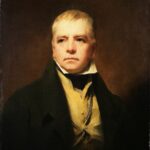Adam Smith (1723–1790): The Father of Economics and the Architect of Capitalism
Adam Smith (1723–1790) stands as one of the most influential thinkers in modern history—a Scottish philosopher and economist whose groundbreaking work, The Wealth of Nations (1776), laid the foundation for classical economics and shaped the global capitalist system. Known as the “Father of Economics,” Smith articulated the principles of free markets, division of labor, and the “invisible hand,” concepts that would underpin the rise of industrial capitalism and modern economic theory. His insights into human behavior, trade, and markets provided a blueprint for the emerging economic order of the 18th and 19th centuries. Smith’s intellectual rise was closely tied to the Scottish Enlightenment—a period of remarkable intellectual and cultural flowering that established Scotland as a center of philosophical and scientific innovation. Yet Smith’s life was not one of dramatic public triumphs. He was a quiet, introspective man who lived with his mother for most of his adult life, and his personal modesty contrasted sharply with the revolutionary scope of his ideas. This essay will explore Smith’s life and works, the challenges he faced, and the profound legacy of his contributions to economics and political philosophy.
I. Early Life and Education
Adam Smith was born on 5 June 1723 in Kirkcaldy, a small port town on the east coast of Scotland. His father, also named Adam Smith, was a customs officer who died two months before his son’s birth. Smith’s mother, Margaret Douglas Smith, raised him with care and ambition, recognizing his exceptional intellectual abilities from an early age. Smith attended the local Burgh School, where he demonstrated a precocious talent for mathematics, Latin, and literature.
At the age of 14, Smith enrolled at the University of Glasgow—an unusually young age even for that time—where he studied moral philosophy under the influential thinker Francis Hutcheson. Hutcheson’s lectures on the relationship between human nature and moral order profoundly influenced Smith’s later thinking. Smith absorbed Hutcheson’s belief that human behavior was driven not only by self-interest but also by a natural sense of sympathy and moral duty.
In 1740, Smith won a scholarship to Balliol College at the University of Oxford, where he spent six years studying classical literature, philosophy, and political theory. Smith was unimpressed with the intellectual environment at Oxford, where the curriculum was still dominated by medieval scholasticism. “The greater part of the public professors have given up even the pretense of teaching,” Smith later wrote. His disillusionment with Oxford contrasted sharply with the intellectual vigor he had experienced in Glasgow. Despite his frustrations, Smith immersed himself in the works of John Locke, David Hume, and Isaac Newton—thinkers whose emphasis on empiricism and rational inquiry would shape Smith’s intellectual framework.
II. Early Career and The Theory of Moral Sentiments
Smith returned to Scotland in 1746 and settled in Edinburgh, where he joined the circle of thinkers associated with the Scottish Enlightenment, including David Hume, James Boswell, and Adam Ferguson. In 1751, Smith was appointed Professor of Logic at the University of Glasgow, but the following year, he was promoted to the more prestigious position of Professor of Moral Philosophy.
In 1759, Smith published his first major work, The Theory of Moral Sentiments, which established his reputation as a leading moral philosopher. The book explored the nature of human morality and argued that human beings are guided not only by self-interest but also by an innate sense of sympathy and moral judgment.
Smith proposed that human behavior was regulated by an internal “impartial spectator”—a moral conscience shaped by social norms and shared human values. This insight challenged the more cynical view, advanced by thinkers like Thomas Hobbes, that human beings were governed purely by selfish motives.
“The Theory of Moral Sentiments demonstrated Smith’s profound understanding of human psychology and social behavior,” wrote historian Nicholas Phillipson. “It laid the foundation for his later work on political economy by establishing that self-interest and moral order were not mutually exclusive but inherently connected” (Phillipson, 2010).
Smith’s success as a moral philosopher brought him recognition in intellectual circles across Britain and Europe. He was invited to give lectures in Edinburgh and London, where he met leading politicians and economists. His reputation grew further when he became a tutor to Henry Scott, the young Duke of Buccleuch, in 1764.
III. The Wealth of Nations and the Rise of Modern Economics
Smith’s defining achievement came with the publication of An Inquiry into the Nature and Causes of the Wealth of Nations in 1776. The book was the result of over a decade of research and reflection on the nature of trade, labor, and markets. Its central argument—that free markets, guided by the “invisible hand” of competition and self-interest, would generate wealth and economic growth—revolutionized the field of economics.
Smith argued that the division of labor was the key to increasing productivity and efficiency. He famously illustrated this point with the example of a pin factory, where ten workers, each performing a specialized task, could produce thousands of pins a day—whereas a single worker, trying to perform all the tasks himself, would produce only a few.
The idea of the “invisible hand” was perhaps Smith’s most enduring contribution. He argued that individuals, by pursuing their own self-interest, would inadvertently contribute to the greater good of society. “It is not from the benevolence of the butcher, the brewer, or the baker that we expect our dinner,” Smith wrote, “but from their regard to their own interest” (The Wealth of Nations, 1776).
Smith also advocated for limited government intervention in the economy. He believed that markets functioned best when left to regulate themselves, but he acknowledged the need for the state to provide public goods such as infrastructure, education, and defense. His vision of free-market capitalism was tempered by a moral understanding of the need for fairness and social stability.
The Wealth of Nations was an immediate success. It was read by politicians, merchants, and philosophers across Europe and America. Benjamin Franklin and Thomas Jefferson were both influenced by Smith’s ideas, and his theories shaped the emerging economic policies of the United States.
“Smith gave the modern world a new economic grammar,” wrote historian Emma Rothschild. “His work was not merely descriptive but prescriptive—a blueprint for the capitalist order that would come to dominate the modern age” (Rothschild, 2001).
IV. Challenges and Setbacks
Despite the success of The Wealth of Nations, Smith’s career was not without challenges. His advocacy for free markets put him at odds with the mercantilist policies of the British government, which relied on protective tariffs and colonial monopolies. Smith’s ideas about free trade and competition were viewed with suspicion by political and business elites who benefited from the existing economic order.
Smith also struggled with health issues throughout his life. He suffered from nervous exhaustion and chronic digestive problems, which limited his ability to engage in public life. His intellectual temperament—reserved, introspective, and occasionally melancholic—contrasted sharply with the bold and radical nature of his ideas.
V. Legacy and Influence
Adam Smith died on 17 July 1790 at the age of 67. His legacy is monumental. The Wealth of Nations became the foundational text of classical economics, influencing generations of economists, including David Ricardo, John Stuart Mill, and Milton Friedman. His vision of competitive markets and limited government intervention laid the groundwork for the development of capitalism in the 19th and 20th centuries.
Smith’s work also shaped public policy. His ideas on free trade influenced the repeal of the Corn Laws in 1846 and guided British trade policy during the rise of the British Empire. His moral philosophy, outlined in The Theory of Moral Sentiments, remains influential in the fields of ethics, psychology, and political theory.
“Smith’s invisible hand remains one of the most powerful metaphors in political and economic thought,” wrote Rothschild. “He gave the modern world not just a theory of economics, but a vision of human society grounded in reason, competition, and moral order” (Rothschild, 2001).
References
Phillipson, N. (2010). Adam Smith: An Enlightened Life. Yale University Press.
Rothschild, E. (2001). Economic Sentiments: Adam Smith, Condorcet, and the Enlightenment. Harvard University Press.
Skinner, A. (1996). A System of Social Science: Papers Relating to Adam Smith. Oxford University Press.
O





